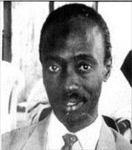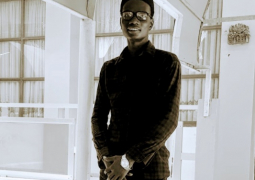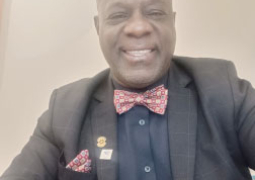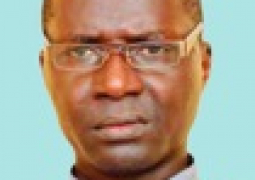
The interview was conducted on 5th February 2012
Dr Barry – Dr Taal, let us begin from the time that you were led by the hand to the school. Which school was it? Can you tell us specifically around which time it was? And tell us about your experience as a child when you started school.
Dr Taal – Well, if I can recall, I was taken to school by my mother, who enrolled me at the Muhammadan Infant School. Muhammadan Infant School is located at the junction of Leman Street and Orange Street, where you have the Half Die Health Clinic now, and the headmistress was Mrs Bal Bah, an old lady who used to be in Oxford Street. When I went to Primary One, the person who received me in school was Mrs Amie Jow. Mrs Amie Jow was among the earliest Gambian Wollof educationist, so I went to the school – because, at that time, you must go to school at the age of five. I was born in 1944, so I started school in 1949.
It was a very exciting event for me because I wanted to go to school and the history of Leman Infant School is quite interesting because it’s an Infant School to the Muhammadan School, which was located at Buckle Street, so you have to do infant school then transit to primary school at Muhammadan School from Infant School. I recall I had some very good memories of the school, and even so, many of my classmates were very stubborn because the school was intended for the people of Half Die. There is a very interesting history of why a school was built in Half Die; I’m not sure you’ve captured that. They said that one of the governors – in the early days, it was a Governor Blood- took an evening stroll on horseback, went to Half Die, and fell off, so the children laughed at him. So as a result, he thought these children were very rude because they were not educated, and therefore, they put up the first school in Half Die as an Infant school, so I happened to have been one of those who attended the Infant School.
At the Infant School, I also have very good memories of some of my teachers because by the time I got to Standard three - because you do Infant School up to Standard Three at Leman Street - I recall having Mr Njie. Teacher Njie later became an Islamic Quranic Teacher who used to live on Primet Street, and he was brilliant and motivated many of us. He made us like going to school although he was strict in his way, we looked forward to going to see Teacher Njie because we admired him and of course, I think his son, who passed away very early in life, we used to call Chalks, actually died in the sea because we used to go swimming there.
I transferred from Muhammadan School to Standard Four. When we joined Muhammadan School, I found myself in the class of Mrs Goddard; Mrs Goddard was a teacher that everybody admired because she was a mulatto and also very pretty, and you can imagine young boys like pretty teachers in those days. But Mrs Goddard was a very tolerant person. She would even take us home to her house on Daniel Goddard Street and give us classes. I also want to recall some of my memories of Infant School. Mrs Joof also taught me; I think she is called Henrietta Joof, and she is the mother of Henry Joof. Mrs Joof was another dynamic teacher who influenced a lot of our childhood – she was a Catholic, but to us, Mrs Joof was like a mother. So I think one of the things that I enjoyed about my primary school was that I always mainly mingled with females, and I think it was because they acted as former surrogate mothers to us.
It was very difficult to attend secondary school, especially high school because the numbers were limited.
Dr Barry – Exactly. What was your experience in high school?
Dr Taal – So some of us, who did not meet the (grades), could not proceed to Methodist Boys High School or St Augustine’s. So I think in the mid-50s, we find ourselves in a situation where we have to finish Standard 7 and leave school. But luckily for us, our parents put much pressure on the colonial administration, and they built Crab Island School. So I transited among the lucky ones to go to Crab Island School. Then Crab Island School was headed by Mr Cates. I think at this point. I want to recollect some of our teachers also before Crab Island. Those who were in Muhammadan School; include Mr Eku Forbes, who became a brilliant soccer player. He was one of the best teachers we had. Yea, and Kama Badjie –when Kama graduated from Cape Coast and arrived at school that morning with his Cape Coast blazer, we admired him so much that, just by his appearance, he inspired us. Then the school was under Master Jarra.
Dr Barry –Yes. He was the first Muslim to head the school.
Dr Taal – Yes, and the religious teacher who used to lead prayers was Serign Modou Lamin Bah, the Imam of Banjul. So he had to connect with the Muslim community because it was compulsory to do our 2 o’clock prayer, the last prayer before we got out of school. So I think it was also good because it gave us some religious teachings.
We transited to Crab Island School, where I found myself in the X Class –the senior class because I left Muhammadan School in Standard Six. When I went to Crab Island School, I would like to recall that besides Mr Cates, who was the principal, Master Silla was there who later took over the school, but he was a teacher, the most inspiring teacher I ever found in my whole life in the school was Kajay Coker. Mr Kajay Coker was a unique character; he was a disciplinarian but a brilliant teacher. We used to say that they always gave Kajay the most difficult class, but that class had the best passes at the certificate because Kajay Coker would not even give you your result to take home. He would bring it home to your parents by hand.
Dr Barry – Oh, OK
Dr Taal – Kajay Coker had a system in which he had on the board all the performances in English and Maths every day – whatever you score, there is a bar against your name. So the longest bars are those doing well, and the smallest bars are those not doing well in class. So there was a competition in class.
Then I finished Crab Island School, and I think I finished Crab Island School in 1958/59 without the required educational standard or the physical fitness to get a job. Hence, it means that I joined this honourable group called mbayewaaho.
Dr Barry – What? Mbayewaaho?
Dr Taal – Mbayewaaho means those who have no job and will go and hang around the streets of Banjul.
Dr Barry – (laugh out loud)
Dr Taal – But I was very ambitious. My mother was a United Party of P S Njie party militant. So P S Njie, who had a connection with Waldiodio Ndiaye in Senegal, decided to take me to Senegal. So I was taken to Dakar to go and attend Ecole St Michelle.
Dr Barry – I see now where the secret of your French is coming from
Dr Taal – I went to Dakar, but besides that, I used to spend all my holidays in Dakar; my elder sister was married there, and then we lived in Rubeus, so I had this liking for Senegal. But when I went to Dakar with P S Njie, one of the conditions of attending a Senegalese School in those days was that you had to be a French citizen. So it meant I had to change my nationality from a Gambian to a Senegalese, which I did not want to do, so I decided to return home. So I returned home and rejected the offer to be in St Michelle. In 1960 – by that time, I. M. Garba Jahumpa, between 1958 and 1960, sent a lot of young Gambians to Ghana, where Musa Bittaye, Tamsir Jallow and most people were going to continue their education. Still, I insisted I wanted to go to Sierra Leone because my elder brother, Ebou Taal, was a Gambian Cricket Captain and made a name in Sierra Leone as a brilliant batman and had some connection in Sierra Leone and that year, he got his scholarship to go to FBC, so I used that opportunity to go with him. He decided to pay for me to attend the Albert Academy. The Albert Academy is an Evangelical United Brethren Church Boarding School located below the hill of Fourah Bay College. So I enrolled in that school in 1960, meaning I had to attend church because it’s a boarding school and a Christian school. The morning prayer sermon must be conducted in Christianity, and evening prayers must be conducted in Christianity. I stayed in the school for five years until I became the school's senior prefect. I was there with many Gambians, Dr Alhassan Njie and Dr Baba Njie.
Dr Barry –OK
Dr Taal – We all attended Albert Academy, and I was very lucky because the lady who got me the position at Albert Academy was a doctor of the minister for Trade and Industry in those days, called Isatou Taylor Camara; the Taylor Camara’s are very strong, they are from Kisilo, so she was my mentor – like a mother to me and guided me. She would buy everything for me; she would buy me my sandals; she would ensure that I was well looked after – she was like my mother. So I stayed in Albert Academy from Form One to Form Five, but while there, I decided that I would also mix with the Sierra Leoneans and integrate very well. So during the holidays, I would go up line with the Sierra Leoneans and spend some time with the Sherbro people in Shenge; I would take a train to Moyamba and from Moyamba back to Shenge. Sometimes, I would go to Bo with my Mandinka colleagues and the Bayo family. I will go to Segbwema with the Mendes, and I will go to Koidu with the Konos. And since I was a good cricket player and a football player and I was also a good softball player and volleyball player, I was in the school team. So I used to go to Bo High school to play cricket; I would go to Magburaka Boys High School to play cricket or football. I would go to Taiama Boys High to go and play softball or volleyball. So because of sports, I could go around Sierra Leone more than any other Gambian student and up until today. I’m just from Freetown. I attended their conference on Transformation on Change through the recommendation of the current Ambassador, His Excellency Kemo Fadi Kah, who was my classmate from Form One to Form Five. Still, he was a day scholar, so I have very good strong links with Sierra Leone.
When I was in Form Three, I had taken my younger brother Bai Mass Taal to come and join me, so he came to Form One. When I finished Form Five, I could not get a government scholarship to do my Sixth Form because I was not a Sierra Leonean. Still, I was admitted to Fourah Bay College under prelim. Because I could not get a scholarship, I came to the Gambia to do my Sixth Form at the Gambia High School for two years, where I did my Sixth Form with a Gambian Scholarship.
Dr Barry –That was around 60…?
Dr Taal – From 1965 to 1967
Dr Barry – OK
Dr Taal –I got my O levels in 1965 from Sierra Leone and came around 1966/67; it was a 2-year programme, and then I got my A levels. I was a very good history student and a good geography student, and a good government student. I did English Literature also. So when I got my A levels, I was short of one because you had to have 4 A levels before getting a Gambian Government Scholarship for university.
Dr Barry – Oh, ok
Dr Taal – Well, I had 3 A levels and 1 Pass, i.e. Geography, so I went to join the teaching field as an Unqualified Teacher, and I was posted at Crab Island School.
Dr Barry – OK, your alma mata
Dr Taal – So at Crab Island, I decided to enrol to do my A levels as an external student to resit Geography. So, after school, I will stay at Crab Island and study. In fact, I inspired a lot of other teachers who decided to do their A levels, such as Lawyer Basso Mbye and Demba Gaye. We became a study circle, and that is when I started my student radicalism – youth radicalism.
Dr Barry –Lol
Dr Taal –Kent Street Vous was formed. When I got my A levels, it meant I had 4 A levels and about 9 O levels, so I had enough, but I did not want to study in Africa. So for the scholarship to Fourah Bay College, scholarship to Ghana, and scholarship to Ibadan, I refused to apply. It’s either I go to UK, America or somewhere else. Then luckily, Demba Ndow, who was the then Permanent Secretary, Ministry of Local Government, was administering the scholarship, and Kalilu Singateh was the Minister for Education who had a liking for me, so he nominated O J Sallah and me for a Commonwealth scholarship – they only take hundred Africans per annum.
(To be continued – contact us on 7777654 / 3336663)




